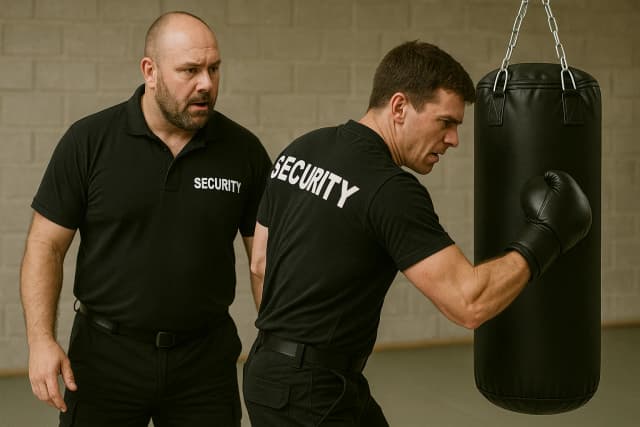4 results
4 results
Subjects
Methods of Study
Course Levels
Physical Intervention Refresher/Crossover Training
The aim of this course is for the learner to have the necessary knowledge and skills required in the private security industry with respect to physical intervention.
Hurak Learning
Classroom
From£174.99
Pay 3 monthly interest-free payments with

From£174.99
Pay 3 monthly interest-free payments with

Level 3 Physical Intervention (Trainer) Course
The Level 3 Award for Physical Intervention Trainers is designed for tutors who wish to deliver Level 2 physical intervention training as part of both the SIA Door Supervisor course and the Door Supervisor Refresher course.
Hurak Learning
Online
From£599.99
Pay 3 monthly interest-free payments with

From£599.99
Pay 3 monthly interest-free payments with

Level 3 Award in the Delivery of Conflict Management Training
Designed for trainers, security professionals, and workplace supervisors, this qualification lets you deliver conflict management training across sectors like SIA security, retail, healthcare, and customer service.
Hurak Learning
Online
From£349.99
Pay 3 monthly interest-free payments with

From£349.99
Pay 3 monthly interest-free payments with

SIA Trainer Course
Become qualified to deliver SIA training by completing our SIA Trainer Course package, and progress into teaching courses such as Door Supervisor, Security Guarding, and CCTV, building a long-term trainer career in the security industry.
Hurak Learning
Online
From£999.99
Pay 3 monthly interest-free payments with

From£999.99
Pay 3 monthly interest-free payments with

General FAQ's
SIA Trainer Courses are specialised programmes designed to train individuals to become trainers in the security industry. These courses cover various topics such as instructional techniques, training delivery methods, security industry regulations, and conflict management.
Upon successfully completing an SIA Trainer Course, you will receive a certification as an SIA Trainer. This certification serves as recognition of your expertise and qualifications as a trainer in the security industry.
SIA Trainer Courses are typically offered both in-person and online, providing flexibility for learners. You can choose the mode of delivery that suits your schedule and learning preferences. If you need more information, I recommend reaching out to Hurak support.
It is possible to pursue SIA Trainer Courses while working full-time in another profession. The flexible course schedules and online learning options make it feasible to balance your current job commitments while gaining the necessary qualifications to become an SIA Trainer.
Yes, individuals with disabilities are welcome to pursue SIA Trainer Courses. The aim is to provide equal opportunities for everyone interested in becoming a trainer in the security industry, ensuring inclusivity for all.
As an SIA Trainer, you have the opportunity to specialise in specific areas of the security industry based on your expertise and interests. Whether its conflict management, physical intervention, or any other specialisation, you can focus your training and provide in-depth knowledge to learners in those particular areas.
Yes, SIA Trainers are expected to adhere to professional ethics and maintain high standards of conduct. These standards encompass integrity, respect for learners, upholding confidentiality, and promoting a safe and inclusive learning environment.



